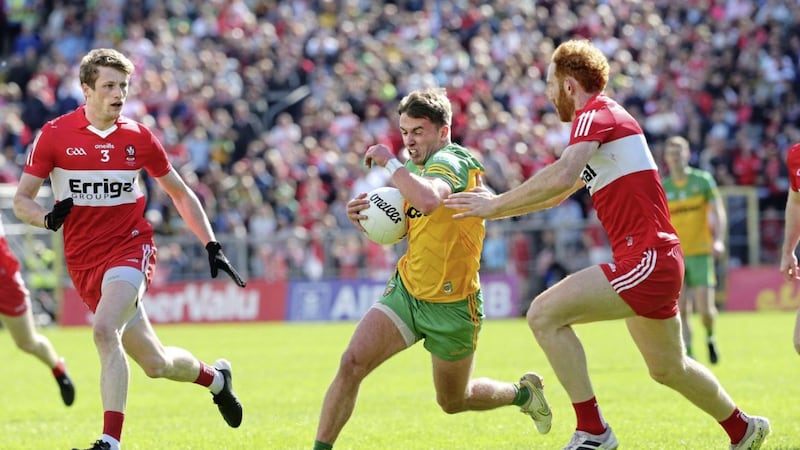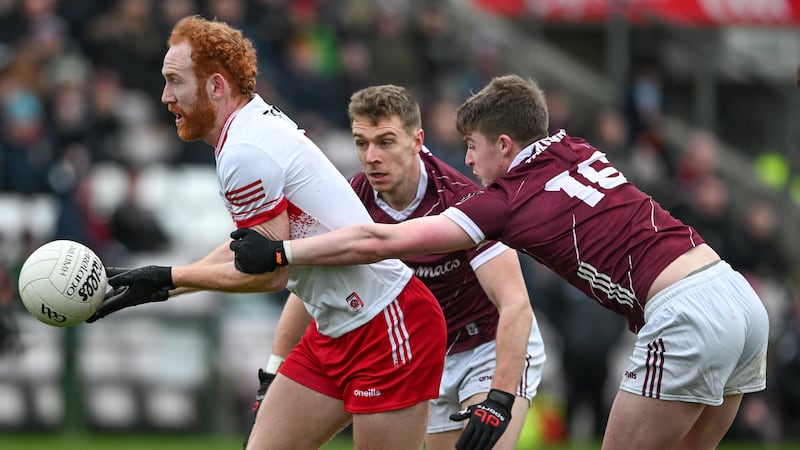AGAINST THE BREEZE
WHILE always keen to highlight the worthiness of their welfare activities, the great irony of the Gaelic Players' Association is that their real brilliance has been in the commercial sector.
Truth be told, the GAA owes a huge debt of gratitude to the players' body. Younger, sharper and hungrier, the GPA has always been much quicker to spot opportunities where revenue streams can be created or increased. The GPA has a track record of highlighting areas where the GAA was failing to exploit the full potential of a particular market.
Consider these two examples. In the not too distant past, the GAA's sponsorship system provided room for only one company per game. Guinness had the hurling. Bank of Ireland had football. That was it.
Then Donal O'Neill, the GPA's very own Gordon Gekko, burst onto the scene. The business-minded O'Neill had served his apprenticeship with a sports management company and he made no apologies for identifying the obvious.
O'Neill pointed to all the major sporting events and observed that the GAA's sponsorship model was hopelessly outdated.
O'Neill said the GAA should be following the same route as the Champions League. They should be recruiting one title sponsor for football and hurling and several associate sponsors. A few years later, and hey presto, the GAA was implementing O'Neill's advice, virtually to the letter.
Dessie Farrell, who replaced O'Neill as the chief executive of the GPA, has also shown how the GAA was behind the times.
During the 2012 Allstar tour to New York, Farrell delivered an impressive presentation. During the course of his talk, he observed that Aussies Rules was being shown on a cable channel in America. More than 12 million Americans were tuning in to a highlights programme. At the same time, Irish immigrants were still relying on elaborate satellite contraptions to see certain GAA games, which were only available in pubs.
Farrell's message was clear. The GAA's foreign broadcast deal wasn't fit for purpose. Two years later and we have GAAGo, a digital channel which is already broadcasting Championship games to 157 countries. Gaelic games are now accessible to anyone whose television, computer, tablet or mobile phone is connected to the internet. When it comes to fund-raising, the GPA has also proved to be well ahead of the game.
Under the terms of the five-year deal brokered in 2011, the GAA agreed to give the GPA €8.75 million, that's €1.75m per year. The GPA insisted €1.75m wasn't enough. To fulfil all their goals and objectives, they wanted approximately €4m per year.
The GAA insisted they wouldn't provide that amount of money. However, they gave the GPA the green light to make up the deficit via their own fund-raising activities. The GAA also stipulated that the GPA's fund-raising efforts couldn't clash with other units of the Association.
True to form, the GPA immediately spotted a lucrative gap in the market - corporate America. Their last three fundraising banquets have all been in New York - Gekko's town.
Last October, the gala dinner was held in the New York Plaza Hotel. Suffice to say, it's a plush spot. A room at the Plaza tonight will cost you £700. The Waldorf Astoria is only £350.
The GPA's pitch is remarkably simple.
They present themselves as the playing wing of the GAA and they hand out awards to wealthy but deserving Americans.
In 2012, they honoured Donald R Keough, the former President of Coca-Cola. Keough turned up and was delighted to receive his Ireland/US Heritage Award.
Last year's committee was cochaired by Adrian Jones, the managing director of Goldman Sachs.
Forget 'Strictly Irish Dancing' and sponsored bike rides. The Heritage Awards are the way to go. Corporate America has proved to be fertile ground. Last year's dinner raised $600,000.
It would be extremely churlish to criticise the GPA for their latest demonstration of financial ingenuity. Faced with a €2m deficit and the challenge of raising revenue from untapped sources, they found a solution. Their enterprise should be applauded. However, the GAA needs to step in and stop the GPA's fund-raising work.
Negotiations are currently underway for the new five-year deal which will run from January 2016.
In the initial talks, Paraic Duffy and Fergal McGill have represented the GAA while Dessie Farrell and Donal Og Cusack have acted on behalf the players' body. Under the new deal, Croke Park should ensure that the GPA's transatlantic fund-raising is brought to an end.
And if that means increasing the money given to the GPA, they should make that compromise. What is the problem with the GPA raising money in America?
It's simply a matter of credibility. The GPA is a players' union. Its primary purpose is player welfare. Just take a look at the GPA's website and observe the vast range of services they provide for players.
The list includes:
* Cardiac screening
* Injury insurance and dental protection
* Scholarship programmes
* Training and development
* Career planning and job searching
* Entrepreneur programmes
* Personal counselling and addiction support
* Financial and tax advice
* Hardship fund
If the GPA is to deliver the best welfare possible, they can't afford to be dividing their efforts. America is an unnecessary diversion. No man can serve two masters.
If Dessie and Donal are constantly travelling to and from New York, they will not be channelling their formidable energy into the extensive range of projects which have been set up for the players at home.
Moreover, it's unfair to expect the GPA to fulfil both of those very demanding challenges.
If the GAA really wants the GPA to come inside its tent, it should be prepared to fund them accordingly. Its players union shouldn't be running to America to scrape up money for its programmes.
A better alternative would see the GAA take ownership the Ireland/ US Heritage Awards. The bulk of the funds could be directed to the GPA. It would also be a good idea to distribute some of the money to the clubs around New York.
Yet again, the GPA has shown the GAA how and where money can be raised. And yet again, the GAA should humbly copy and paste the GPA's strategic model.
But a new line needs to be drawn in the sand. As the governing body, it is incumbent upon the GAA to provide the players' union with money. It's the GPA's job to provide players with support. Those roles shouldn't be confused.


